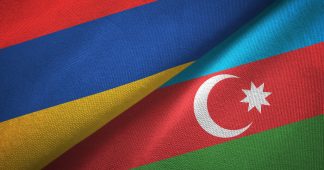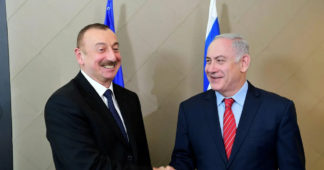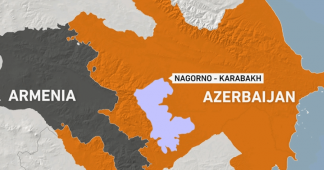by Prof. Dimitris Scarpalezos
The ethnic conflicts after the fall of the Soviet Union, disguised as national conflicts, are a product and an application of imperialism, which does not care about the lives and cultural and religious rights of the populations concerned, but mainly about their geometry of geopolitical and economic influence. This happened in the Nagorno Karabakh conflict soon after after the fall of the Soviet Union as happened in the ethnic (and not national) conflict in Donbass in 2014. The imperialist influence everywhere wants “ethnic” (and not national or in any sense patriotic) states.
In Nagorno – Karabakh a many centuries-long Armenian ethnic presence was put in danger by the new state with the monoethnic ideology of Azerbaidjan (following in this sense the dangerous monoethnic ideology of Kemalism). The new Armenian republic quite rightly wanted to protect this population and its small autonomous republic which was threatened by Azeri monoethnic “patriotism”. Armenians fought grimly for this, but when they occupied the zone between Armenia and Nagotno karabakh they showed also no consideration for the rights of the azeri majority of this zone and they reacted as if those populations were part of the old Turco-Armenian conflict, with its and myths and hates, based on the memory of the horrible genocide of Armenian population in the Ottoman empire.
As in the case of Ukraine at the beginning of the conflict, the only solution acceptable to the populations of the two countries and the “international” community would have been a solution accepting the official borders, but granting strong protection and autonomy for the endangered minority.
The solution would been a kind of a “Minsk 2 agreement” for this case, with constitutional force for both states. Nagorno-Karabakh could be officially in the Azeri republic, but with strong autonomy, at least as strong as the autonomy of Catalonia inside Spain or of Scotland inside Great Britain, or Quebec in Canada, with some specific rights of double citizenship for the inhabitants:
Both states would have a joint duty of protection and help for those populations which live in relatively isolated areas, while the corridor of contact between Armenia and Nagorno Karabakh would remain constitutionally open for the movements of the inhabitants of this autonomous republic. The autonomous republic would have a National Guard with sufficient arms to protect it from provocations and nationalistic or criminal attacks. An agreement would also leave an open right of passage through specified routes from Azerbaidjan to its isolated province Nachitchevan and which would be open as long as the other would continue to be open.
The two states would collaborate to prevent the transformation of those corridors for purposes other than those stipulated in this agreement, and block any transit of criminal smuggling or weapons.
An official of an embassy of Armenia, also in Nagorno Karabakh, would be able to help, culturally and socially, the local Armenian population whose religious tradition and teaching would be constitutionally protected and under local autonomy.
Such an agreement might help to make Armenians understand that Azeri are not Ottoman Turks, and that Azeri and Armenians are not enemies of their respective nations and their culture or religion. A strong cooperation of the two republics as in Soviet times might stop the danger of war and the ethnic hatred for the two peoples, who have everything to gain by such cooperation.
Russia could be a guarantee power, with India and Iran for such a peaceful solution with the help, also, of the United Nations.
Agreements can be found, if people understand that war is very often the worst outcome.
We remind our readers that publication of articles on our site does not mean that we agree with what is written. Our policy is to publish anything which we consider of interest, so as to assist our readers in forming their opinions. Sometimes we even publish articles with which we totally disagree, since we believe it is important for our readers to be informed on as wide a spectrum of views as possible.










